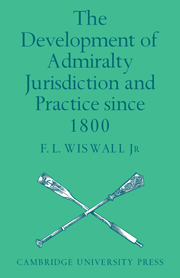Book contents
- Frontmatter
- Contents
- Preface and Acknowledgments
- List of Admiralty Judges
- Abbreviations and Symbols
- Table of Statutes
- Table of Cases
- Dedication
- INTRODUCTION
- 1 THE ERA OF STOWELL
- 2 THE COURT RESURGENT
- 3 THE FALL OF DOCTORS' COMMONS
- 4 THE GREAT TRANSITION
- 5 THE COURT UNDER COMMON LAWYERS
- 6 THE EVOLUTION OF THE ACTION in rem
- CONCLUSION
- Bibliography
- Index of Subjects
- Index of Persons
- Frontmatter
- Contents
- Preface and Acknowledgments
- List of Admiralty Judges
- Abbreviations and Symbols
- Table of Statutes
- Table of Cases
- Dedication
- INTRODUCTION
- 1 THE ERA OF STOWELL
- 2 THE COURT RESURGENT
- 3 THE FALL OF DOCTORS' COMMONS
- 4 THE GREAT TRANSITION
- 5 THE COURT UNDER COMMON LAWYERS
- 6 THE EVOLUTION OF THE ACTION in rem
- CONCLUSION
- Bibliography
- Index of Subjects
- Index of Persons
Summary
The theme of this study becomes apparent only at the last: the development of Admiralty jurisdiction and practice since 1800 has not been confined to the dry stuff of enactments and repeals, or even to the more interesting matter of establishment, following of or departure from judicial precedents. Men, as types and individuals, have been responsible for the Law during every second of every day; it is the change in the philosophy of men–sometimes slow and sometimes abrupt–which gives substance to raw and otherwise uninspiring data.
Some have viewed one important change as a great conquest of the civilians by the common lawyers, and lamented the change in the status and structure of the Admiralty Court. But while the facts of history may legitimately give rise to lament for the passing of a noble body of scholars and the venerable status of the Court as a direct instrument of the Royal Prerogative, it must be observed that this development has had no great effect upon either the function or operation of the Court. It was noted after Sir Robert Phillimore's retirement that the intimate atmosphere of the Court under the civilians had not wholly changed with the move to the Strand and a common lawyer upon the bench, and the picture today is still one of a calm and unhurried administration of maritime justice, free from the drama and sensation of juries and crowds of spectators, and with a small and select professional attendance.
- Type
- Chapter
- Information
- Publisher: Cambridge University PressPrint publication year: 1971



